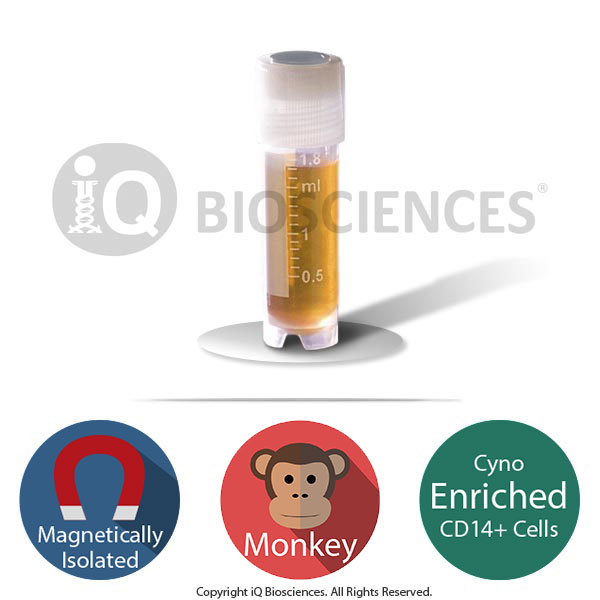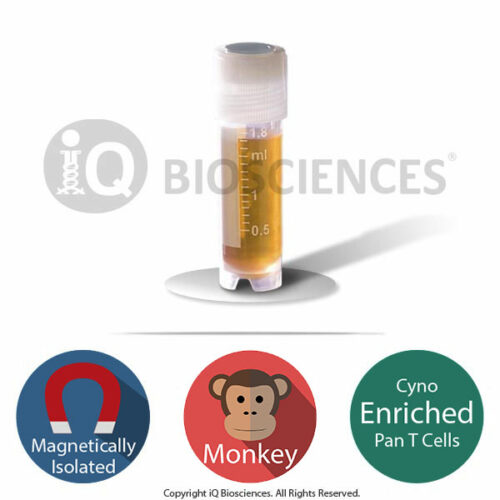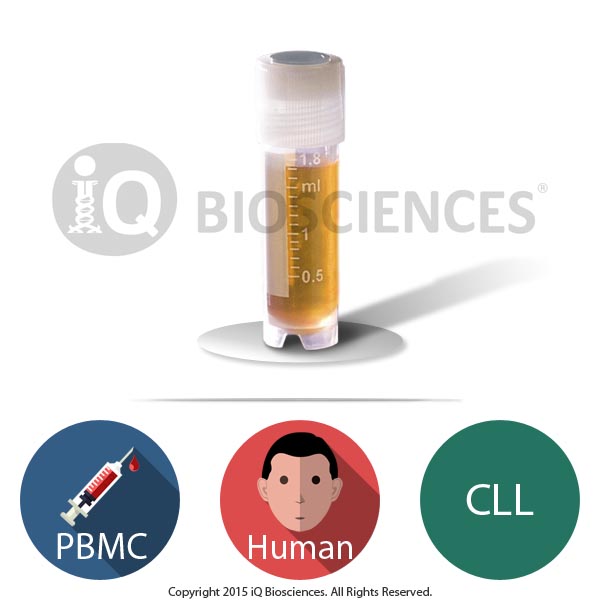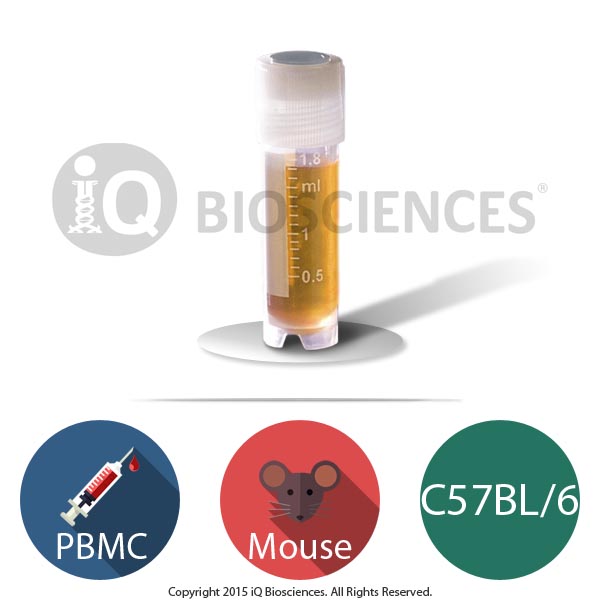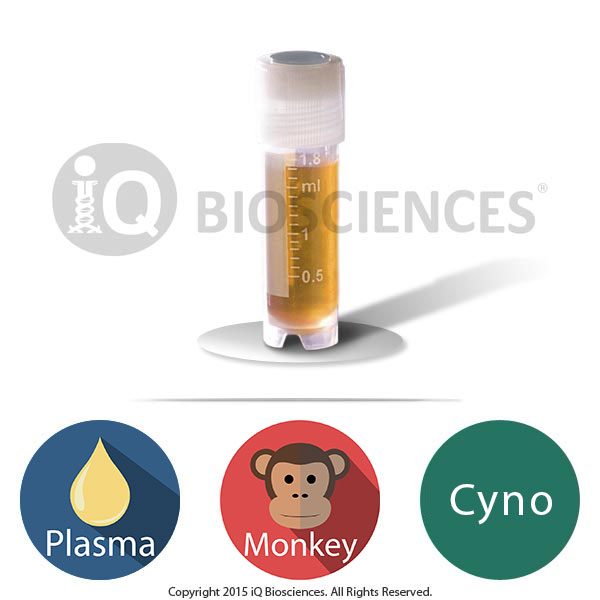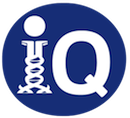- CD14+ cells purified from cynomolgus macaque PBMCs by magnetic isolation
- Ideal source for cynomolgus monocytes and neutrophils
- Used for a wide variety of safety assessment and functional assays
- Carefully cryopreserved to ensure high viability (> 90%) upon thawing
- All orders come with an iQ Certificate of Analysis
Purified Cynomolgus Monkey CD14+ Cells
$880.00 – $1,695.00
- Description
- Additional information
- Donor Request
- Ethics
- iQ Experience
- Shipping Information
- Distributors
Description
About the Cynomolgus Monkey (or Cynomolgus Macaque)
The cynomolgus macaque is the most commonly utilized non-human primate in biomedical research. According to some researchers, these monkeys are ideal models due to the 90-93% genetic similarity to and recent evolutionary divergence from humans. They are employed in numerous research areas, such as immunology, neuroscience, oncology, diabetes, and pharmacology due to their genetics and physiology.
Cynomolgus Macaque Monkey CD14+ Cells
CD14+ cells make up approximately a third of cells in the blood of a typical adult monkey. Monocytes and neutrophils typically make up the cells that express CD14+ cells. When activated, monocytes can phagocytose foreign cells and perform antibody-dependent cellular phagocytosis (ADCP). They can also produce and secrete inflammatory cytokines. Developmentally, monocytes can mature into macrophages and dendritic cells depending on the soluble factors they are exposed to in order to become more specialized immune subsets. Neutrophils are a subtype of granulocytes, which can also perform phagocytosis of microorganisms and secrete enzymes to destroy them.
Cyno CD14+ Cell Application Summary
Purified cynomolgus CD14+ cells are a good source of cells to study the biology of monocytes and their role in the immune system since they make up approximately 50% of CD14+ cells. These isolated cells can be used to examine the differentiation and development of the monocyte population to the macrophage or dendritic cell subsets depending on the cytokine environment. Further, these differentiated cells and monocytes can also be used for stimulation-dependent functional experiments to assess cytokine production and antigen presentation.
Similarly, isolated CD14+ cells are a good source of mature neutrophils to study their biology, in particular their functional capabilities. They are capable of secreting enzymes, as well as performing phagocytosis in response to foreign organisms.
With the current trend toward development of immuno-modulatory drugs, CD14+ cells are an ideal source of cells to test inflammatory factor production in the presence of therapeutic molecules. More importantly, these cells can be used to assess toxicity and safety characteristics of these biologics before first in-human trials as these cells can be employed in pre-clinical settings to ensure the biologics are not eliciting unwanted monocyte or neutrophil-mediated functions.
Cyno CD14+ Cell Purification
Collection of samples
Cynomolgus PBMCs were sourced from a responsible third party vendor that operate according to local regulations and laws.
Magnetic Positive Isolation of CD14+ Cells
To purify cynomolgus CD14+ cells, PBMCs were incubated with antibodies against CD14 and subsequently passed through a magnetic column. The cells that pass through are the non-CD14+ cells, which can be used for other purposes, while the labeled CD14+ cells are left bound to the column. These cells are subsequently eluted to obtain purified CD14+ cells.
Contact us for more information about purchasing our magnetically isolated CD14+ cells.
Purity
A small aliquot of Cyno CD14+ cells was tested for post-sort purity by flow cytometry analysis. Purity of CD14+ cells, as defined by CD14+ expression, was > 95% (Figure 1).
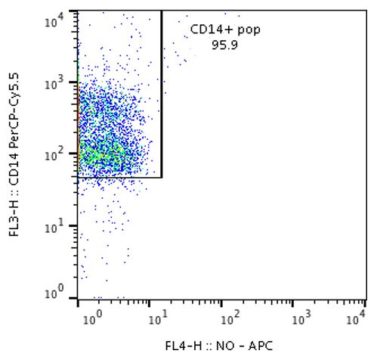
Figure 1. Purity of CD14+ cells after magnetic isolation from cynomolgus PBMCs. Cynomolgus PBMCs were incubated with antibody against CD14 and then subjected to magnetic separation to obtain CD14+ cells. A small aliquot was taken after selection to evaluate post-sort purity by flow cytometry.
Cryopreservation and storage
Purified CD14+ cells were cryopreserved carefully using iQ Biosciences’ cryopreservation protocol that ensures high viability (> 90%) after thawing.
Cells should be stored at < -120 °C once they are received, such as within a liquid nitrogen tank (vapor phase).
Additional information
| Available Size(s) | |
|---|---|
| Cell Type | |
| Format | |
| Species | |
| Tissue Type | |
| Viability | > 90% |
We are happy to accommodate the following donor requests if inventory is available. Feel free to inquire prior to ordering, or specify your interest in the "Order notes" section during checkout and we will follow-up with your shortly after your order is processed:
- Single or multiple donors for a particular product (SKU). Indicate number of vials from each individual donor
- Donor-matched PBMCs
- Donor(s) with a higher percentage of the cells of interest, i.e., B cells, CD14+ cells, CD4+ cells, CD8+ cells, or NK cells (for PBMC products only)
We are Committed to Ethical Practices
iQ Biosciences’ primary cell products from non-human primates are collected under approved IACUC protocol, which was developed in consultation with the Attending Veterinarian and is consistent with current veterinary standards. The collection facility is AAALACi and PHS accredited, and all animal housing, handling, and research protocols are consistent with standards set forth by the Animal Welfare Act, NIH's Policy on Humane Care and Use of Animals and the Guide for the Care and Use of Animals. All animal housing and handling is done in such a way to minimize stress and risk of injury to the animal.
For US customers, we ship via FedEx Overnight Shipping. Shipping charges will vary per shipping address (based on ZIP code) and are estimated to be $140.
For international (non-US) customers, we work closely with you and our couriers to ensure all necessary documentation is in place for international shipments to significantly reduce the chance of delays at Customs. For the export of non-human primate samples, this includes preparing CITES permits, as well as any other documentation as required by country. Please submit an inquiry to orders@iqbiosciences.com for your estimated time of delivery and shipping charges.
Austria
Hölzel Diagnostika Handels GmbH
Tel: +49 221 126 02 66
Email: info@hoelzel.de
Web: https://www.hoelzel-biotech.com/
Canada
Cedarlane
Tel: +1 (289) 288-0001
Toll Free (North America): +1 (800) 268-5058
Fax: +1 (289) 288-0020
Email: sales@cedarlanelabs.com
Web: https://www.cedarlanelabs.com
China
BIOHUB INTERNATIONAL TRADE CO., LTD.
上海起发实验试剂有限公司
Address: Chuansha Rd #6619, Pudong, Shanghai, Zipcode: 201200 P.R.China
Tel: 0086-021-50724187
Phone: +86-15921799099
Fax: 0086-021-50724961
Email: sale3@78bio.com
Web: www.qfbio.com
European Union
Caltag Medsystems Ltd.
Email: office@caltagmedsystems.co.uk
Web: https://www.caltagmedsystems.co.uk
tebu-bio
Web: https://www.tebu-bio.com
Or Find a local contact
Germany
Hölzel Diagnostika Handels GmbH
Tel: +49 221 126 02 66
Email: info@hoelzel.de
Web: https://www.hoelzel-biotech.com/
Zageno
Web: https://zageno.com/
Ireland
2B Scientific Ltd
Tel: +44(0) 1869 238033
Fax: +44(0) 1869 238034
Email: sales@2BScientific.com
Web: https://www.2bscientific.com
India
Cell & Gene BioSolutions Pvt. Ltd.
#478 C, SLV Complex, Raghavendra Swamy Mutt Road
Opp. Turahalli Water Tank, Turahalli, Subramanyapura Post
Uttarahalli Hobli, Bengaluru-560061, Karnataka, India
Phone: +91 97317 14670
Phone: +91 98809 25033
Email: info@cgbios.com
Web: www.cgbios.com
Japan
Cosmo Bio Co., Ltd.
Tel: +81 (03) 5632 9610
Fax: +81 (03) 5632 9619
Email: nsmail@cosmobio.co.jp
Web: https://www.cosmobio.co.jp
Qatar
Sedeer Medical Services and Trading LLC
Tel: +974 4434 9191
Email: info@sedeer.com
Web: https://sedeer.com/
Singapore
Omnicell Pte Ltd
Tel: +65 6747 0201
Email: enquiry@omnicell.com.sg
Web: https://omnicell.com.sg/</a
South Korea
BioClone
Tel: +82-2-2690-0058
Email: bioclone@bioclone.co.kr
Web: http://www.bioclone.co.kr
Switzerland
Hölzel Diagnostika Handels GmbH
Tel: +49 221 126 02 66
Email: info@hoelzel.de
Web: https://www.hoelzel-biotech.com/
Taiwan
Hycell International Co. Ltd.
Tel: +886-2-2877-1122
Fax: +886-2-2876-1520
Web: http://www.hycell.com.tw
United Kingdom
2B Scientific Ltd
Tel: +44(0) 1869 238033
Fax: +44(0) 1869 238034
Email: sales@2BScientific.com
Web: https://www.2bscientific.com
Caltag Medsystems Ltd.
Tel: +44 (0)1280 827460
Fax: +44 (0)1280 827466
Email: office@caltagmedsystems.co.uk
Web: https://www.caltagmedsystems.co.uk
tebu-bio
Tel: +44 (0)1733 421880
Fax: +44 (0)1733 421882
Email: uk@tebu-bio.com
Web: https://www.tebu-bio.com
Zageno
Web: https://zageno.com/
United States
Fisher Scientific
Tel: 1-800-766-7000
Web: https://www.fishersci.com
Quartzy
Web: https://www.quartzy.com
VWR International
Tel: 1-800-932-5000
Web: https://www.vwr.com
Zageno
Web: https://zageno.com/
